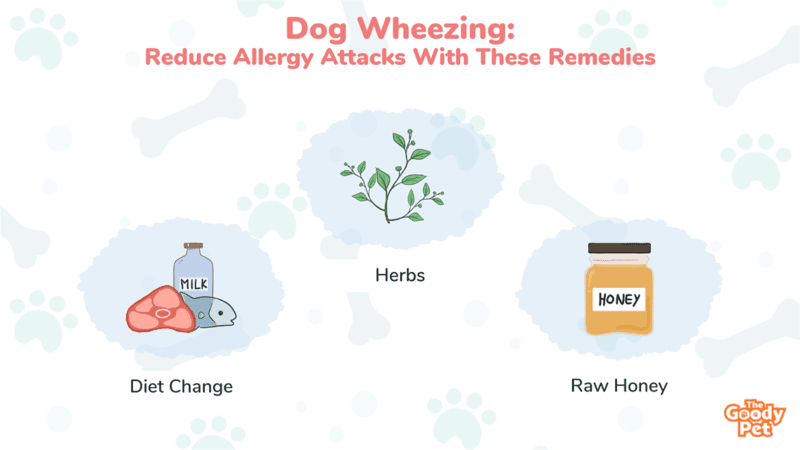Watching a dog wheeze can be quite a frightening experience for any dog owner. But even more frightening is cluelessness while your furry friend is passing through breathing difficulties.
Now, what can you give your dog to reduce wheezing induced by allergy attacks? You can reduce allergy attacks in your dog via the use of home remedies such as raw honey and herbs with special anti-inflammatory properties, such as licorice root. Additionally, certain over-the-counter medications such as Benadryl are quite effective at tackling allergy attacks in dogs.
Why do dogs wheeze in the first place, and if you have a dog with a history of respiratory problems, what can you do to make life easier for such a pooch? Answers to these and more are provided in today’s article. But before we go further, let’s see some of the best home remedies you can give your dog to help it breathe better.
What Home Remedies Can I Give My Dog To Breathe Better?
Once you’ve determined that the cause of your dog’s wheezing is not a potentially fatal condition requiring professional medical attention, there are several home remedies that can provide relief and aid your pooch through an allergic attack:
Raw Honey
You can treat a dog suffering breathing difficulties by feeding it a mixture of honey and other appropriate natural supplements. Raw honey helps soothe a dog’s throat, and when mixed with coconut oil, dandelion or licorice root, becomes quite an effective natural antihistamine for canines suffering from respiratory problems.
Additionally, honey is rich in pollen, and by feeding your doggie tiny amounts of honey at a time, you’ll be gradually building up its pollen tolerance, thereby helping such a doggie breathe easier, when it’s eventually exposed to pollen.
Herbs
Certain herbs possess anti-inflammatory properties and provide soothing effects for coughing dogs, and it’ll be highly beneficial to incorporate these herbs into your doggie’s meals.
Some of the herbs that can bring relief to a coughing dog include Garlic, Marshmallow Root, Licorice Root, Coltsfoot, Inula Helenium and Yarrow.
Quercetin, which is a natural antihistamine that’s commonly found in fruit peels and vegetables is useful for curbing inflammation caused by respiratory issues, and it’s an effective option for treating your dog’s asthma at home.
Diet Change
To complement the effects of the home remedies listed above in combating breathing difficulties in your dog, it can also help to modify your pooch’s feeding plan.
Wheezing caused by food allergies in dogs is commonly triggered by substances such as beef, fish, pork, dairy, and you should keep an allergic doggie away from meals containing these items.
You should work with your vet to determine food substances that trigger allergic reactions in your dog, after which you can prepare your doggie’s meals by yourself.
By doing this, you have complete control over what goes in your pooch’s meals. And this, in turn, reduces such a doggie’s exposure to food allergens that trigger wheezing, thereby helping it breathe better.

What Is The Best Allergy Medicine For Dogs When Wheezing?
Antihistamines
Antihistamines are one of the most common solutions to problems of allergic reactions in dogs. And with a prescription and instructions from your vet, you can administer any of the available options to counter reactions in your pooch.
Benadryl is one of the most common antihistamines typically prescribed by vets for countering dog allergies. And when administered in the appropriate dosage, Benadryl can be quite effective at relieving a wheezing dog. Even better, Benadryl is widely available, and can be procured at local medicine or pet stores.
Apart from Benadryl, other over-the-counter antihistamines such as Zyrtec, Apoquel and Claritin are also widely prescribed and used for relieving allergy symptoms such as wheezing, in dogs.
Corticosteroids
Apart from antihistamines, your vet may also prescribe the use of synthetic corticosteroid medication to help relieve inflammation and manage wheezing attacks in dogs.
Corticosteroids typically prescribed for use in dogs include dexamethasone, prednisolone and canine prednisone. And these are typically available as injections, pills or even as inhalers!
However, you should know that corticosteroids typically have side effects such as excessive urination and increased drinking on dogs; hence, prolonged usage isn’t recommended.
Use Humidifiers To Aid Breathing
In addition to the medications listed above, you can also employ the use of humidifiers to tackle wheezing in dogs. Humidifiers work by emitting vapour to increase moisture level in the atmosphere, and this in turn, makes it easier for a dog with respiratory issues to breathe.
To provide relief to a wheezing dog via a humidifier, simply place the humidifier near its sleeping location both day and night. And the effects of a humidifier on a dog with breathing difficulties are usually noticed from anywhere between a few hours to days of consistent usage.

Why Does My Dog Have Wheezing Attacks?
Wheezing is a certain indicator that your pooch is having trouble breathing, but this is only a broad explanation, and there are several reasons a dog may be finding it difficult to breathe properly.
Some of the more common causes of wheezing attacks in dogs include:
Allergic Reactions
Dogs are triggered by a lot of natural and artificial agents, and one main reason for wheezing in a pooch, is a reaction to one or more of the several allergens present in its environment.
Dust, cigarette smoke, pollen or smoke are just some of the allergens responsible for dog wheezing. And wheezing in this situation is typically accompanied by nasal discharge, itchiness, vomiting and diarrhea, among others.
Respiratory Infections
Another major cause of wheezing attacks in dogs is an infection of the respiratory tract. If your dog makes weird breathing noises, it may be suffering from any of the respiratory tract infections that commonly affect canines such as kennel cough, canine influenza, bronchitis, pneumonia and canine asthma, among others.
Additionally, fluid build-up in the lungs, known medically as pulmonary edema, may also be responsible for your canine’s wheezing.
Parasitic Infections
Increased wheezing in your dog can also be a sign that parasites such as hookworms, nasal mites and roundworms have made their home in your doggie’s lungs and airways; This leads to irritation and inflammation of the respiratory organs, which, in turn, makes it increasingly difficult for a dog to breathe, hence, wheezing.
Foreign Objects In The Throat
If your dog keeps coughing and gagging like he’s choking, then it probably has a stick, stone or a bone piece stuck up its throat; These foreign objects block the doggie’s airways, thereby making it quite difficult for the dog to breathe.
You can tell that your canine has a foreign body lodged in its throat if it sounds like he’s snoring while asleep or when it constantly paws at its throat in an attempt to dislodge the object. In this case, prompt medical attention is needed to ensure the safety of your furry friend.
Breed
Certain canine breeds such as the short-nosed, brachycephalic dogs typically have breathing difficulties due to their shortened nasal passages.
And over-exertion during physical exercises makes it significantly more difficult for such dogs to breathe, thereby resulting in wheezing.
Other causes of wheezing attacks in dogs include:
- Choking
- Over-excitement
- Poisoning
- Obesity
- Heat stroke

How Can I Help My Dog With Respiratory Problems?
Below are some things you can do, as owner, to bring relief to your furry friend with respiratory problems, and help your furry friend breathe better:
Eliminate Allergens
Respiratory problems in doggies can be made much worse by an allergic reaction; Hence, to keep your dog safe and comfortable, you should limit its exposure to these allergens as much as possible.
Regular cleaning of carpets and furniture with a powerful vacuum cleaner will go a long way in keeping your home free of allergic triggers in dogs. Additionally, it may help to stop taking your dog on walks when there’s a significant amount of pollen in the air (pollen count is highest early in the morning and late in the evening).
For dogs suffering food allergies, trying out an elimination diet plan can help pinpoint what exactly is bad for your furry friend, and you can subsequently stop feeding your doggie such food substances.
Steam Therapy
Steam is particularly effective at loosening up a dog’s airways. And you can provide relief to a doggie with a congested airway by exposing it to an appropriate amount of steam.
To apply steam therapy in aiding a canine with respiratory problems breathe better, move the dog to the bathroom, and run the shower at the highest temperature possible. Steam from the hot water will help free your dog’s airways, thereby making breathing much easier.
Reduce Physical Activity
If your dog has a history of running out of breath during physical sessions, then you should reduce the intensity of its exercises to prevent overexertion, and avoid the occurrence of wheezing attacks.
Additionally, if you own a brachycephalic dog, you should, in addition to maintaining a strict control over exercise levels, minimize the doggie’s exposure to extremely hot or humid weather conditions.
When Does It Become Necessary To See A Vet?
While all the steps listed before are things you can do at home to help a canine with breathing difficulties, it is advisable that you take your dog with respiratory problems to see a vet, if you notice symptoms such as:
- Vomiting
- Seizures
- Repeated pawing at the mouth
- Skin discoloration
- Nasal discharge
The above may be symptoms of a much more serious condition, and the doggie may require prompt medical attention to prevent the situation from escalating.

Related Questions
How Do You Clear A Dog’s Lungs? Depending on the severity, fluid in a dog’s lungs, also known as pulmonary edema, can be cleared by allowing such a pooch to inhale steam from boiled water. Additionally, your vet can prescribe oxygen therapy to treat fluid build-up in the lungs, and you can also administer antibiotics to deal with pneumonia resulting from a filled lung.
What Is The Most Common Allergy In Dogs? Dogs are triggered by a wide variety of allergens, but the most common cases are skin allergies typically caused by substances found in the atmosphere such as pollen, mold, dust and smoke. Food is also a major allergic trigger in dogs, and a pooch may also start itching uncontrollably if it comes in contact with fleas.
Can I Put Vicks On My Dog’s Chest? No, it is strongly recommended that you don’t put Vicks on your dog’s chest. Dogs have a super sensitive nose, and the sharp smell of camphor, menthol and eucalyptus contained in Vicks may be too much for a pooch to handle.





